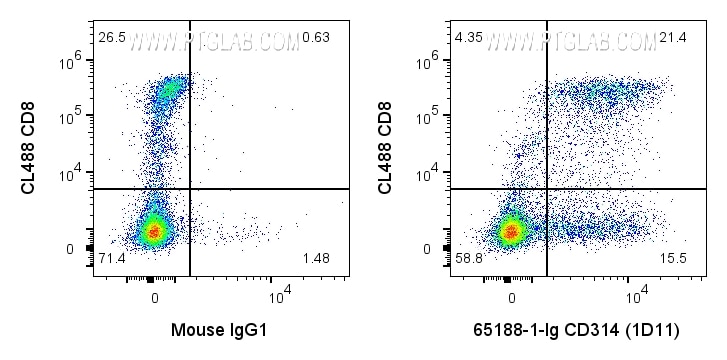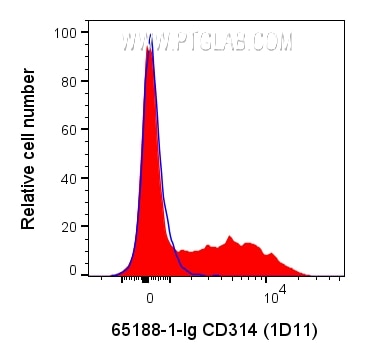Validation Data Gallery
Tested Applications
| Positive FC detected in | human PBMCs |
Recommended dilution
| Application | Dilution |
|---|---|
| This reagent has been tested for flow cytometric analysis. It is recommended that this reagent should be titrated in each testing system to obtain optimal results. | |
| Sample-dependent, Check data in validation data gallery. | |
Product Information
65188-1-Ig targets CD314/NKG2D in FC applications and shows reactivity with Human samples.
| Tested Reactivity | Human |
| Host / Isotype | Mouse / IgG1, kappa |
| Class | Monoclonal |
| Type | Antibody |
| Immunogen | NKL cell line 相同性解析による交差性が予測される生物種 |
| Full Name | killer cell lectin-like receptor subfamily K, member 1 |
| Calculated molecular weight | 25 kDa |
| GenBank accession number | BC039836 |
| Gene Symbol | KLRK1 |
| Gene ID (NCBI) | 22914 |
| RRID | AB_2918459 |
| Conjugate | Unconjugated |
| Form | Liquid |
| Purification Method | Purified by protein-A affinity chromatography |
| UNIPROT ID | P26718 |
| Storage Buffer | PBS with 0.09% sodium azide , pH 7.3 |
| Storage Conditions | Store at 2-8°C. Stable for one year after shipment. |
Background Information
CD314, also known as NKG2D or Killer cell lectin-like receptor subfamily K member 1 (KLRK1), is a type II lectin-like transmembrane stimulatory receptor (PMID: 8436421). In humans, it is expressed on NK cells, gamma delta T cells, and CD8+ alpha beta T cells (PMID: 10426993). Various families of cell surface ligands have been identified, including the MICA/MICB and ULBP proteins (PMID: 12150888). CD314 is involved in both innate and adaptive immunities, and the NKG2D/NKG2DL pathway involves multiple effector cell types for controlling tumor progression (PMID: 31720075).
Protocols
| Product Specific Protocols | |
|---|---|
| FC protocol for CD314/NKG2D antibody 65188-1-Ig | Download protocol |
| Standard Protocols | |
|---|---|
| Click here to view our Standard Protocols |

